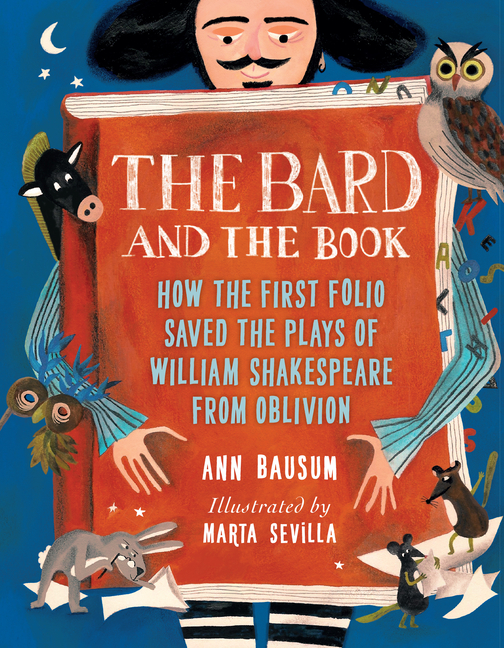Book Descriptions
for The Bard and the Book by Ann Bausum and Marta Sevilla
From Cooperative Children's Book Center (CCBC)
“Act I: William Shakespeare Becomes Brilliant, Then Dies.” A captivating account details how the works of Williams Shakespeare were saved from obscurity thanks to the First Folio, printed seven years after his death. The creation of this first compilation of Shakespeare’s plays was far from an easy feat, this history makes clear. The idea of printing a play as a literary work was relatively new. Quarto editions of some of the Bard’s plays existed (not all of them reliable), but the effort of compiling whole plays, let alone his body of work, was enormous. The spirited narrative touches briefly on the life and work of Shakespeare, and practices in Elizabethan theater that clarify why there weren’t handwritten editions of each play to draw upon, before describing efforts that likely went into creating the First Folio. This includes a detailed account of the printing process, which explains why there are differences among various printings (referenced in the playful title to Act III: “Romeo and Juliet Tussle with Their First Teen Reader”). The author’s fascination with her subject shines in a work that illuminates much that is known and how we know it, but also how much is still unknown about Shakespeare and the First Folio, 235 copies of which are known to have survived the centuries. (Others may still be undiscovered!) Appealing design elements include large font, diagrams, photographs of artifacts, and whimsical spot art. A marvelous author’s note, source notes, and more follow the closing curtain. (Age 12 and older)
CCBC Book of the Week. © Cooperative Children's Book Center, Univ. of Wisconsin - Madison, 2024. Used with permission.
From the Publisher
The unlikely true story of why we know the name William Shakespeare today, and the four-hundred-year-old book that made it possible.
Four hundred years ago, no one bothered to write down the exact words of stage plays. Characters’ lines were scribbled on small rolls of paper (as in, an actor’s role) and passed around, but no master script was saved for the future. The main reason we’ve heard of Romeo, Juliet, Hamlet, and Shakespeare himself is that a group of people made the excellent choice to preserve the plays after the Bard died. If they hadn’t created the book known as the First Folio, Shakespeare and his works would surely have been lost to history.
Part literary scavenger hunt (the search for every existing First Folio continues today), part book trivia treasure trove, and part love letter to Shakespeare, this behind-the-scenes, sharply funny true story is an ideal introduction to the Bard and his famous plays.
Four hundred years ago, no one bothered to write down the exact words of stage plays. Characters’ lines were scribbled on small rolls of paper (as in, an actor’s role) and passed around, but no master script was saved for the future. The main reason we’ve heard of Romeo, Juliet, Hamlet, and Shakespeare himself is that a group of people made the excellent choice to preserve the plays after the Bard died. If they hadn’t created the book known as the First Folio, Shakespeare and his works would surely have been lost to history.
Part literary scavenger hunt (the search for every existing First Folio continues today), part book trivia treasure trove, and part love letter to Shakespeare, this behind-the-scenes, sharply funny true story is an ideal introduction to the Bard and his famous plays.
Publisher description retrieved from Google Books.


